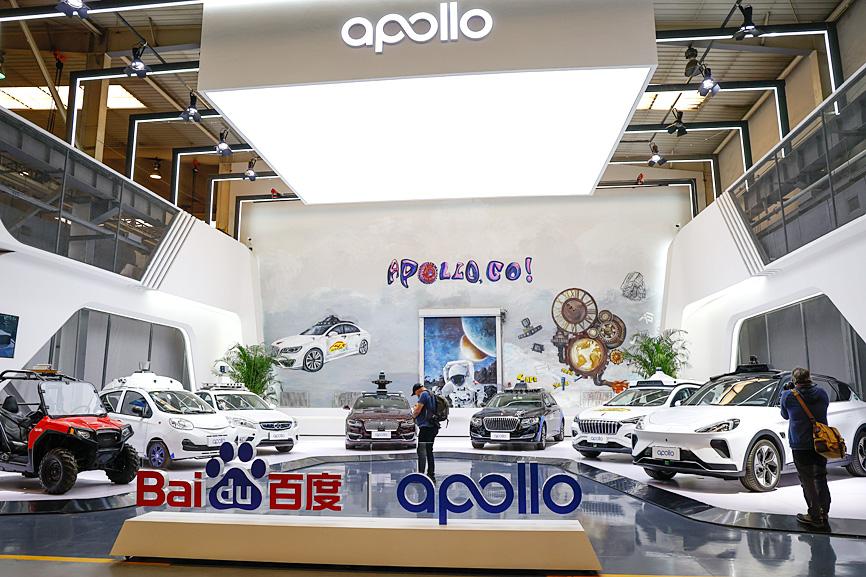China has granted Chinese Internet services company Baidu Inc (百度) and a rival autonomous car company, Pony.ai Inc (小馬智行), permits to provide driverless ride-hailing services to the public in Beijing, a significant regulatory step in the nation’s pursuit of driverless technology.
The permits allow Baidu and Pony.ai to offer rides without a safety driver behind the wheel to take over in cases of an emergency. The new permits still require a safety supervisor to be seated in the front passenger seat.
Baidu said that 10 such autonomous cars yesterday started offering rides to passengers within a 60km2 area in suburban Beijing.

Photo: EPA-EFE
Baidu already operates an autonomous fleet of taxis in Beijing under its Apollo Go ride-hailing services, but they must have a safety driver behind the wheel.
China has ambitions to lead autonomous driving technology globally, but lags the US in introducing such services. Alphabet Inc’s Waymo began offering driverless taxi services in Phoenix, Arizona, in 2020.
In 2020, Beijing set a goal for 70 percent of vehicles sold in 2030 to have Level 2 and Level 3 self-driving technology.
Level 2 is partial driving automation, which means the vehicle can control steering and speed.
Level 3 automation means that the vehicle can detect what is going on around it and drive itself.
Baidu — best known for its search engine and online advertising services — has in the past few years invested heavily in autonomous driving and artificial intelligence (AI) technology, including automated personal assistants and AI chips.
The company said in a statement that it has accumulated more than 27 million kilometers of road testing over the past nine years with no traffic accidents.
Baidu’s Apollo Go autonomous taxi services operate in nine cities across China, including Shanghai, Shenzhen and Guangzhou.

NEW IDENTITY: Known for its software, India has expanded into hardware, with its semiconductor industry growing from US$38bn in 2023 to US$45bn to US$50bn India on Saturday inaugurated its first semiconductor assembly and test facility, a milestone in the government’s push to reduce dependence on foreign chipmakers and stake a claim in a sector dominated by China. Indian Prime Minister Narendra Modi opened US firm Micron Technology Inc’s semiconductor assembly, test and packaging unit in his home state of Gujarat, hailing the “dawn of a new era” for India’s technology ambitions. “When young Indians look back in the future, they will see this decade as the turning point in our tech future,” Modi told the event, which was broadcast on his YouTube channel. The plant would convert

‘SEISMIC SHIFT’: The researcher forecast there would be about 1.1 billion mobile shipments this year, down from 1.26 billion the prior year and erasing years of gains The global smartphone market is expected to contract 12.9 percent this year due to the unprecedented memorychip shortage, marking “a crisis like no other,” researcher International Data Corp (IDC) said. The new forecast, a dramatic revision down from earlier estimates, gives the latest accounting of the ongoing memory crunch that is affecting every corner of the electronics industry. The demand for advanced memory to power artificial intelligence (AI) tasks has drained global supply until well into next year and jeopardizes the business model of many smartphone makers. IDC forecast about 1.1 billion mobile shipments this year, down from 1.26 billion the prior

People stand in a Pokemon store in Tokyo on Thursday. One of the world highest-grossing franchises is celebrated its 30th anniversary yesterday.

Zimbabwe’s ban on raw lithium exports is forcing Chinese miners to rethink their strategy, speeding up plans to process the metal locally instead of shipping it to China’s vast rechargeable battery industry. The country is Africa’s largest lithium producer and has one of the world’s largest reserves, according to the US Geological Survey (USGS). Zimbabwe already banned the export of lithium ore in 2022 and last year announced it would halt exports of lithium concentrates from January next year. However, on Wednesday it imposed the ban with immediate effect, leaving unclear what the lithium mining sector would do in the